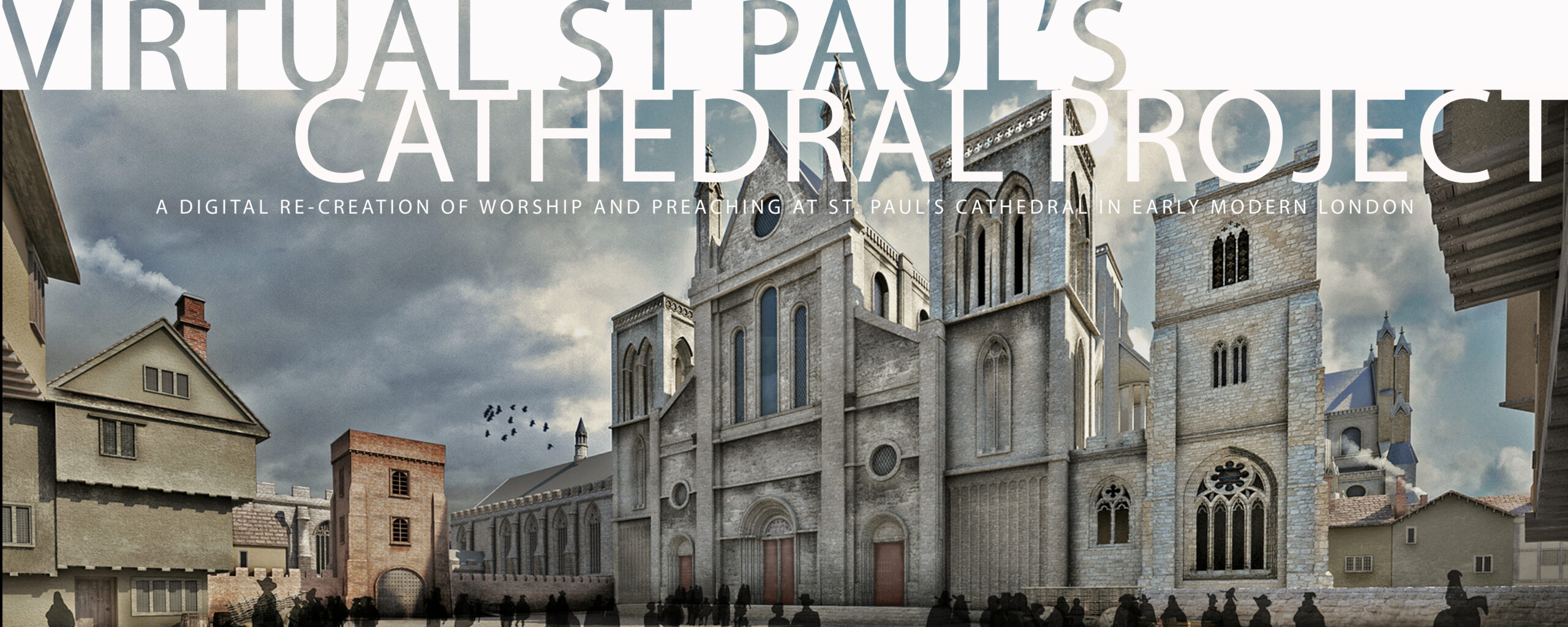The Morning and Evening praier shalbe used in the accustomed place of the churche, chapel, or Chauncell, except it shalbe otherwise determined by the ordinary of the place: and the chauncels shall remain, as they have done in tymes past. . . . And all Priestes and Deacons, shalbe bounde to say dayly, the Morning and Evenyng prayer, eyther privately or openly, except they be letted by preaching, studying of divinitie, or by some other urgent cause. And the Curate that ministreth in every paryshe Churche or Chapell, beyng at home, and not beyng otherwyse reasonably letted, shall say thesame in the Parishe Church or Chapell where he ministreth, and shall toll a belle therto, a convenient tyme before he begyn, that such as be disposed may come to heare Goddes woorde, and to praye with him.
— Book of Common Prayer, 1604
This page of the Cathedral Project website allows the user to experience Advent Morning Prayer from each of the five different Listening Positions we have chosen as representative of the acoustic experience of worship in the Choir of St Paul’s Cathedral during Donne’s tenure as Dean.
At the bottom of this page is an annotated script of this service. To experience all the services from a single Listening Position, go to the Locations page.
Listen from the Dean’s Stall
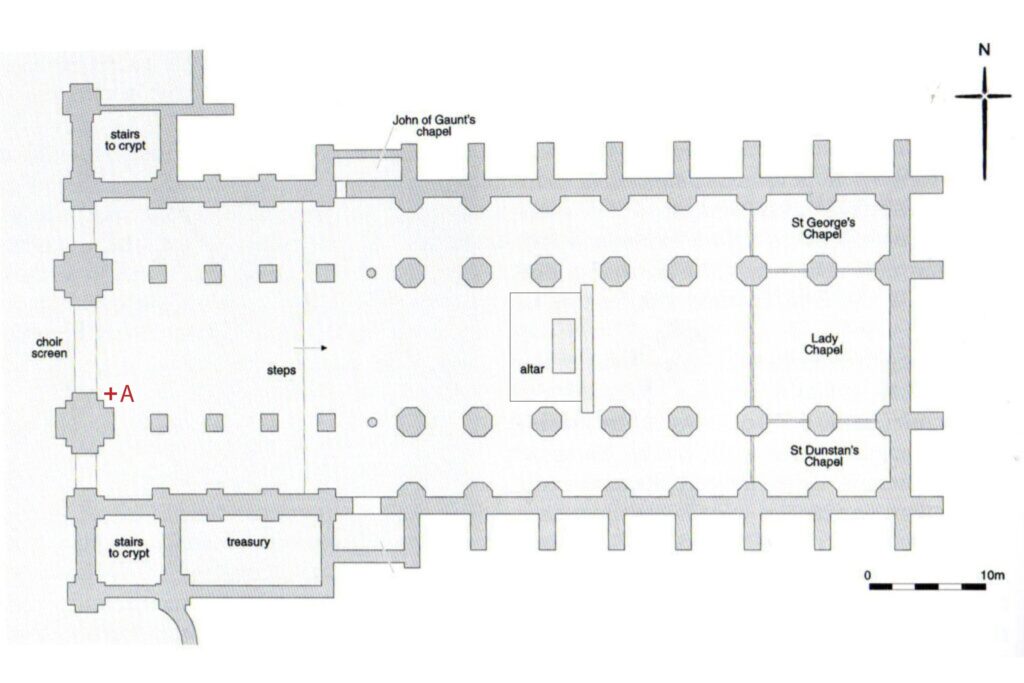
From Midway the Choir
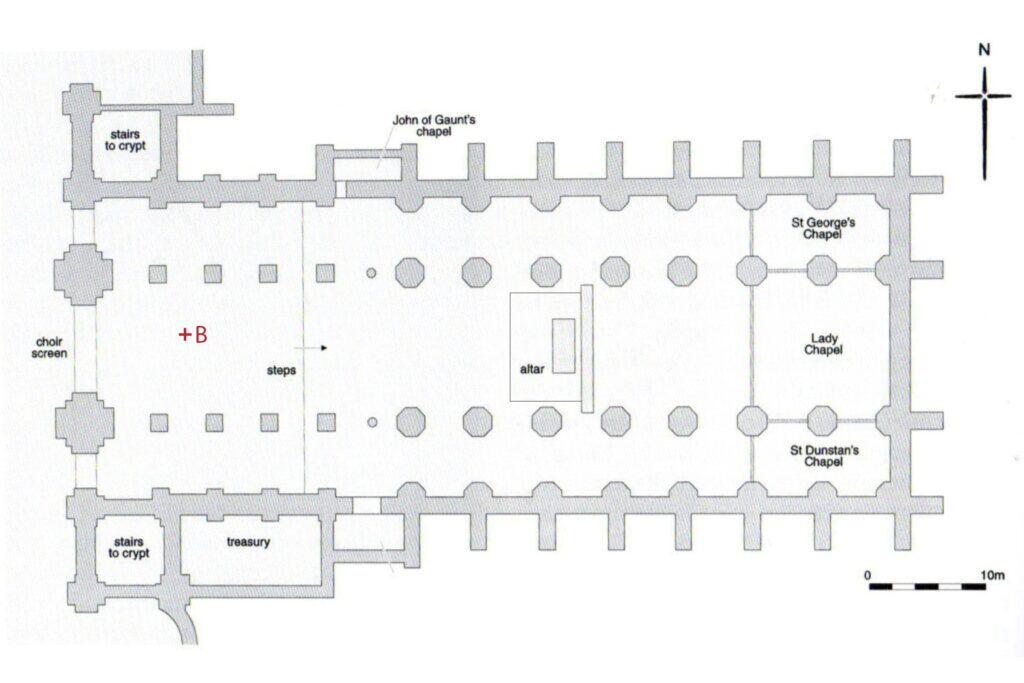
From the Pulpit
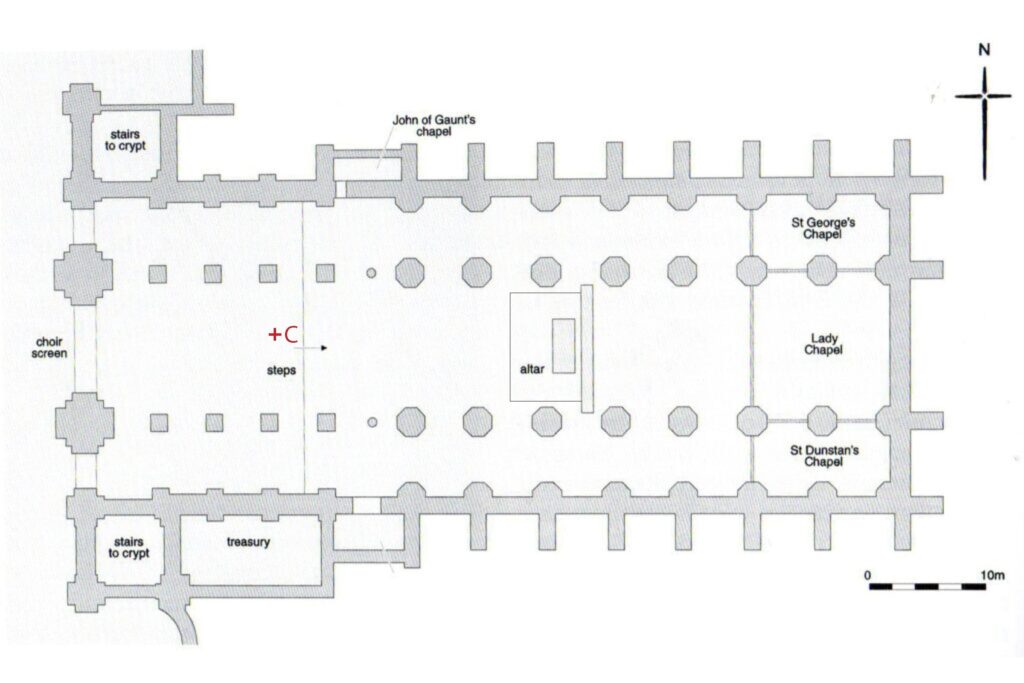
From Midway between the Stalls and the Altar
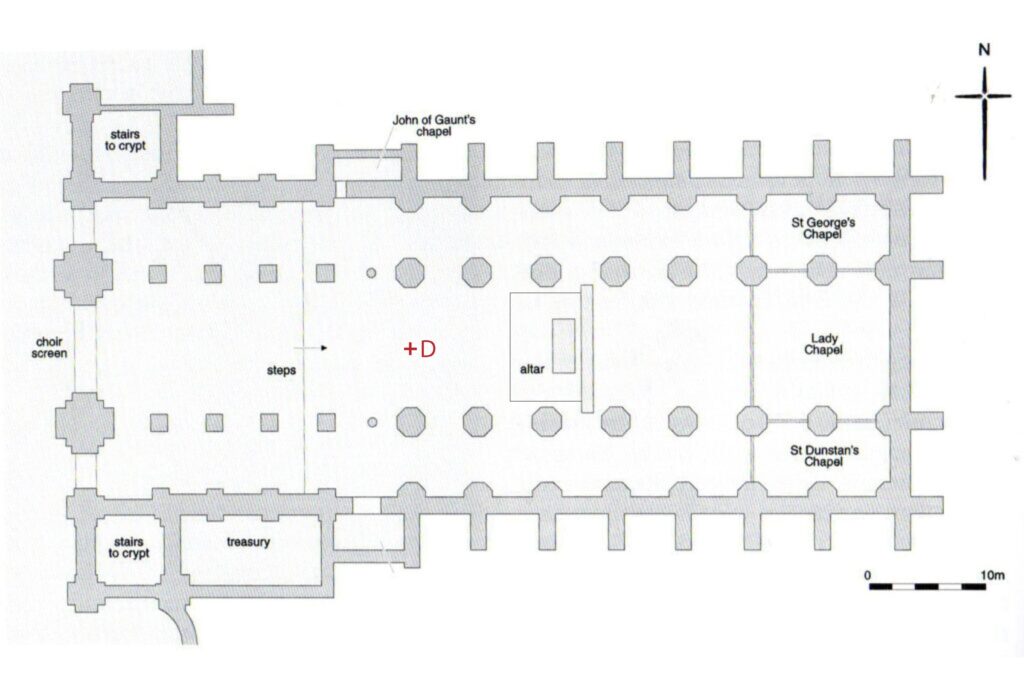
From the South Aisle
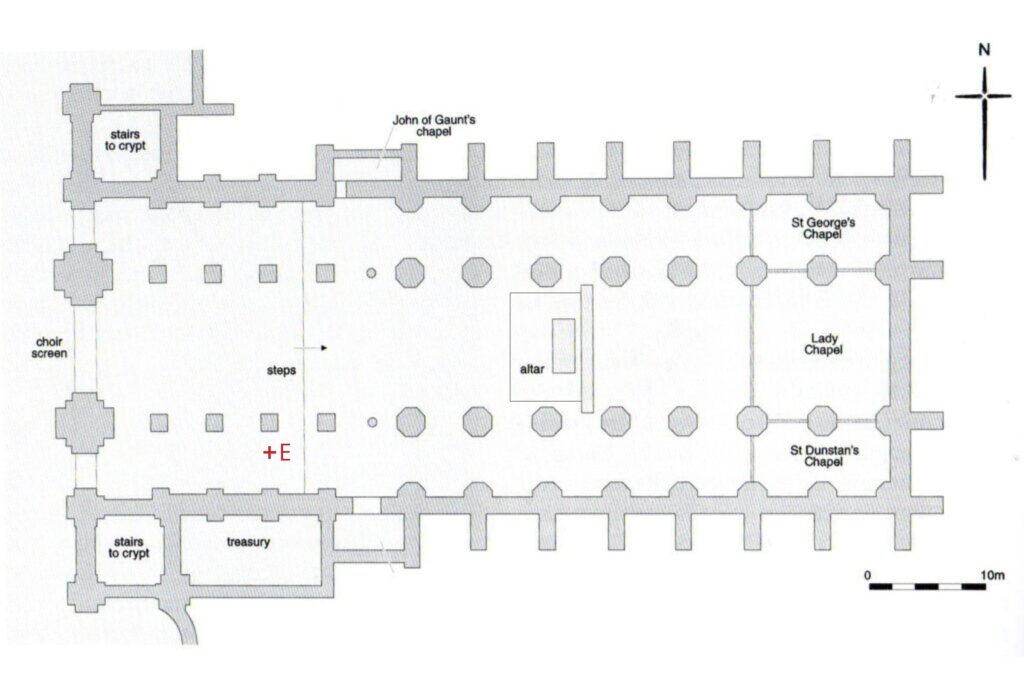
The Annotated Script
Guide to the color coding: The words in black are the words spoken. The words in red are the directions printed in the Book of Common Prayer for the conduct of the service, hence the name rubrics for these directions. The words in blue are the annotations.
MORNING PRAYER
DAYLY THROUGHOUT THE YERE.
This is the script for Morning Prayer on the Tuesday after the First Sunday in Advent in 1625 used to make recordings of this service found elsewhere on this website. Where there are choices to be made in the Rite, only the choices made for these recordings are included. To see the full text of the Rite, consult the Book of Common Prayer in its 1550 or 1604 editions. The easiest way to do this is to consult the edition of the 1559 Prayer Book edited by John E. Booty and published by the University Press of Virginia for the Folger Shakespeare Library, either in the first edition of 1976 or the second edition, with a new Foreword by Judith Maltby, published in 2005.
At the beginning both of Morning Prayer, and lykewyse of Evening Prayer, the Minister shall reade with a lowde voyce, some one of these sentences of the Scriptures that folowe. And then he shall say that, which is written after the said sentences.
Opening Sentences
Morning Prayer begins with the Officiant’s inviting the congregation to order and setting the tone for the particular occasion by proclaming a verse chosen from a collection of biblical verses found at the beginning of Morning Prayer in the Book of Common Prayer.
A sorrowful spirit is a sacrifice to God: despise not, O Lord, humble and contrite hearts.
Invitation to Confession
The officiant then invites the congregation to confess their sins “with a humble, lowly, penitent and obedient heart.” The General Confession then follows, leading to the Absolution “and remission of their sins.”
DERELY beloved Brethren, the Scripture moveth us in sondry places, to acknowledge and confesse our manifolde sinnes and wickednes, and that we should not dissemble nor cloke them before the face of almighty God our heavenly father, but confesse them with an humble, lowly, penitent and obedient harte to the ende that we may obtaine forgevenes of the same by his infinite goodnesse and mercie. And although we ought at all tymes humbly to acknowledge our synnes before God, yet ought we moste chiefly so to doe, when we assemble and mete toguether, to rendre thankes for the greate benefites that we have received at his handes, to sette furth his moste worthie praise, to heare his moste holye worde, and to aske those thynges whiche be requisite and necessarie, aswel for the bodye as the soule. wherfore I praye and beseche you, as many as be here presente, to accompany me wyth a pure harte and humble voice, unto the throne of the heauenly grace, saying after me.
A generall confession, to be made* of the whole congregacion after the minister, knelyng.
ALMIGHTIE and most merciful father, we have erred and straied from thy waies, lyke lost shepee we have folowed to much the devises and desires of our owne hartes. We have offended against thy holy lawes: We have left undone those thinges whiche we ought to have done, and we have done those thinges which we ought not to have done, and there is no health in us. But thou, O Lorde, have mercy upon us miserable offendours. Spare thou them O God, whiche confesse their faultes. Restore thou them that be penitent, accordyng to thy promises declared unto mankynde, in Christe Jesu our Lorde. And graunt, O most merciful father, for his sake, that we may hereafter lyve a godly, ryghtuous, and sobre life, to the glory of thy holy name. Amen.
The absolution , or remission of sins, to be pronounced by the Minister alone.
ALMIGHTY God, the father of our Lord Jesus Christ, which de sireth not the deathe of a sinner, but rather that he maye turne from his wickednesse and lyve: and hath geven power and commaundement to hys Ministers, to declare and pronounce to his people beyng penitent, the absolution and remission of their synnes: he pardoneth and absolveth all them which truly repent, and unfeinedly beleve his holy gospel. Wherefore we beseche him to graunt us true repentaunce and hys holy spirite, that those thynges may please hym, whych we doe at thys present, and that the rest of our life hereafter may be pure and holy so that at the last we may come to his eternall ioye, through Jesus Christe our lorde.
The people shal aunswere.
Amen.
The Lord’s Prayer
The Lord’s Prayer follows the pronouncing of Absolution. The opening responses then follow, in the form of an interchange between the Officiant and the congregation. The opening “O Lord, open thou our lips; / and our mouth shall show forth thy praise,” is based on Psalm 51. Then follows “O God, make speed to save us” with the response “O Lord, make haste to help us”, a loose translation of the Latin Deus, in adjutorium meum intende which begins every service in the Hour services of the Medieval Church, followed by the Gloria Patri in English.
Then shall the Minister heginne the Lordes Prayer wyth a loude voice.
OUR Father, whiche arte in heaven, hallowed be thy name. Thy kyngdom come. Thy will be done in earth as it is in heaven. Geve us this day our dayly breade. And forgeve us our trespasses, as we forgeve them that trespasse against us. And lead us not into temptacion. But deliver us from evil. Amene.
Then likewise he shall saye.
Preces and Responses by Thomas Morley
O Lord, open thou our lippes.
Aunswere. And our mouthe shall shewe furth thy prayse.
Prieste. O God, make spede to save us.
Aunswere. Lord, make haste to helpe us.
Prieste. Glory be to the father, and to the sonne : and to the holye Ghoste
As it was in the beginning, [is nowe and ever shalbe: worlde without ende. Amen.]*
Praise ye the Lorde.
Then shalbe sayde or song, this Psalme folowyng.
What follows is a recitation of Psalm 95 (“O come let us sing unto the Lord: let us heartily rejoice in the strength of our salvation”), here called the Venite, the first word in the Latin translation of Psalm 95. Occasionally, the Venite is replaced by other texts, as it is in the Script for Easter Day 1624.
Venite – Plainchant
O COME let us syng unto the lord: let us hartely rejoyce in the strength of our salvacion.
Let us come before his presence wyth thankesgevinge: and shewe oureselfes gladde in hym wyth Psalmes.
For the Lorde is a great god: and a greate Kynge, above all goddes:
In his hand are al the corners of the earth: and the strength of the hilles is his also.
The Sea is his, and he made it and his handes prepared the drie lande.
O come, let us worshippe and fal doune: and knele before the lorde our maker.
For he is the Lord our god: and we are the people of his pasture, and the shepe of his handes.
To day if ye wyl heare his voyce, harden not your hartes: as in the provocacion, and as in the daie of temptacion in the wildernesse.
When your fathers tempted me : proved me, and sawe my workes.
Fortie yere long was I greved with this generacion, and saide: it is a people that doe erre in their hartes: for they have not knowen my wayes.
Unto whom I sware in my wrath that the shoulde not enter into my rest.
Glory be to the father, and to the sonne: : and to the holye Ghoste
As it was in the beginning, is now, and ever shalbe: worlde without ende. Amen.]
Then shal folowe certeyn Psalmes in order, as they bene appoincted in a table made for that pourpose, excepte there be proper Psalmes appointed for that day, and at thend of everye Psalme throughout the yere, and likewise in thende of Benedictus, Benedicite, Magnificat, and Nunc Dimittis,shal be repeated.
The recitation of a portion of the Book of Psalms then follows. Cranmer divided the Psalter into 60 sections. One of these sections is assigned for use at Morning Prayer; another, at Evening Prayer, for each of 30 days. The divisions are assigned consecutively, so that the Psalms are read through from Psalm 1 to Psalm 150 over the course of 30 days. If a month has more than 30 days, the Psalms assigned for Day 30 are repeated on day 31. For February, the Psalms assigned for days 1 through 28 are recited; for a Leap Year, in February the Psalm assigned for days 1 through 29 are assigned. Today, Tuesday, the 29th of November, 1625, the portion of the Psalter assigned is Section 29, assigning Psalms 139, 140, and 141 to Morning Prayer and Psalms142 and 143 for Evening Prayer.
Psalms 139,140,141 – Plainchant
Psalm 139
1 O LORD, thou hast searched me, and known me.
2 Thou knowest my downsitting and mine uprising, thou understandest my thought afar off.
3 Thou compassest my path and my lying down, and art acquainted with all my ways.
4 For there is not a word in my tongue, but, lo, O LORD, thou knowest it altogether.
5 Thou hast beset me behind and before, and laid thine hand upon me.
6 Such knowledge is too wonderful for me; it is high, I cannot attain unto it.
7 Whither shall I go from thy spirit? or whither shall I flee from thy presence?
8 If I ascend up into heaven, thou art there: if I make my bed in hell, behold, thou art there.
9 If I take the wings of the morning, and dwell in the uttermost parts of the sea;
10 Even there shall thy hand lead me, and thy right hand shall hold me.
11 If I say, Surely the darkness shall cover me; even the night shall be light about me.
12 Yea, the darkness hideth not from thee; but the night shineth as the day: the darkness and the light are both alike to thee.
13 For thou hast possessed my reins: thou hast covered me in my mother’s womb.
14 I will praise thee; for I am fearfully and wonderfully made: marvellous are thy works; and that my soul knoweth right well.
15 My substance was not hid from thee, when I was made in secret, and curiously wrought in the lowest parts of the earth.
16 Thine eyes did see my substance, yet being unperfect; and in thy book all my members were written, which in continuance were fashioned, when as yet there was none of them.
17 How precious also are thy thoughts unto me, O God! how great is the sum of them!
18 If I should count them, they are more in number than the sand: when I awake, I am still with thee.
19 Surely thou wilt slay the wicked, O God: depart from me therefore, ye bloody men.
20 For they speak against thee wickedly, and thine enemies take thy name in vain.
21 Do not I hate them, O LORD, that hate thee? and am not I grieved with those that rise up against thee?
22 I hate them with perfect hatred: I count them mine enemies.
23 Search me, O God, and know my heart: try me, and know my thoughts:
24 And see if there be any wicked way in me, and lead me in the way everlasting.
Glory be to the father, and to the sonne: : and to the holye Ghoste
As it was in the beginning, is now, and ever shalbe: worlde without ende. Amen.]
PSALM 140
1. Deliver me, O LORD, from the evil man: preserve me from the violent man;
2 Which imagine mischiefs in their heart; continually are they gathered together for war.
3 They have sharpened their tongues like a serpent; adders’ poison is under their lips. Selah.
4 Keep me, O LORD, from the hands of the wicked; preserve me from the violent man; who have purposed to overthrow my goings.
5 The proud have hid a snare for me, and cords; they have spread a net by the wayside; they have set gins for me. Selah.
6 I said unto the LORD, Thou art my God: hear the voice of my supplications, O LORD.
7 O GOD the Lord, the strength of my salvation, thou hast covered my head in the day of battle.
8 Grant not, O LORD, the desires of the wicked: further not his wicked device; lest they exalt themselves. Selah.
9 As for the head of those that compass me about, let the mischief of their own lips cover them.
10 Let burning coals fall upon them: let them be cast into the fire; into deep pits, that they rise not up again.
11 Let not an evil speaker be established in the earth: evil shall hunt the violent man to overthrow him.
12 I know that the LORD will maintain the cause of the afflicted, and the right of the poor.
13 Surely the righteous shall give thanks unto thy name: the upright shall dwell in thy presence.
Glory be to the father, and to the sonne: : and to the holye Ghoste
As it was in the beginning, is now, and ever shalbe: worlde without ende. Amen.]
PSALM 141
1. LORD, I cry unto thee: make haste unto me; give ear unto my voice, when I cry unto thee.
2 Let my prayer be set forth before thee as incense; and the lifting up of my hands as the evening sacrifice.
3 Set a watch, O LORD, before my mouth; keep the door of my lips.
4 Incline not my heart to any evil thing, to practise wicked works with men that work iniquity: and let me not eat of their dainties.
5 Let the righteous smite me; it shall be a kindness: and let him reprove me; it shall be an excellent oil, which shall not break my head: for yet my prayer also shall be in their calamities.
6 When their judges are overthrown in stony places, they shall hear my words; for they are sweet.
7 Our bones are scattered at the grave’s mouth, as when one cutteth and cleaveth wood upon the earth.
8 But mine eyes are unto thee, O GOD the Lord: in thee is my trust; leave not my soul destitute.
9 Keep me from the snares which they have laid for me, and the gins of the workers of iniquity.
10 Let the wicked fall into their own nets, whilst that I withal escape.
Glory be to the father, and to the sonne: and to the holye Ghoste
As it was in the beginning, is now, and ever shalbe: worlde without ende. Amen.]
A Voluntary upon the Organ
Cranmer, in his introduction to the 1549 Book of Common Prayer, explained that one major purpose of the Prayer Book Offices was to provide course readings of the Bible, reading through from the beginning to the end of each Book. To achieve this, Cranmer followed the organization of the Bible into Books with chapters and assigned one chapter of a Book of the Old Testament (including the Apocrypha) and one chapter of a book of the New Testament for reading at Morning Prayer and at Evening Prayer for each day of the year. As a result, excpt for some omissions (such as most of the Book of Relevation), the early modern Church read the Old Testament through once a year and the New Testament through three times a year. Together with the monthly recitation of the entire Book of Psalms, this practice was Cranmer’s chief way of responding to his fellow Reformers’ emphasis on Scripture. To make the Bible available for use in Church worship, the Great Bible was, initially, published only in folio, intended to be placed on its own lectern in each church and cathedral. Today being the 29th of November 1625, the Lessons read are those assigned for the 29th day of the month of November.
Then shalbe redde two lessons distinctly with a loude voyce, that the people may heare. The first of the olde Testament, the seconde of the newe, Lyke as they he appointed by the Kalender, except there be proper Lessons, assigned for that daye: the Minister that readeth the Lesson, standyng and turning him so as he may best be heard of all such as be present, And before every lesson, the Minister thai saye thus. The fyrst, second, thyrd, or fourth chapiter of Genesis or Exodus, Mathewe, Marke, or other like, as is appoincted in the Kalender, And in thend of everye chapiter, he shal saye,
¶ Here endeth such a Chapiter of suche a Booke.
And (to the ende the people maye the better heare) in suche places where they do synge, there shall the lessons be songe in a plaine tune after the maner of distinct readinge: and likewise the Epystle and gospell.
The twelfth Chapter of Isaiah
1. And in that day thou shalt say, O LORD, I will praise thee: though thou wast angry with me, thine anger is turned away, and thou comfortedst me.
2 Behold, God is my salvation; I will trust, and not be afraid: for the LORD JEHOVAH is my strength and my song; he also is become my salvation.
3 Therefore with joy shall ye draw water out of the wells of salvation.
4 And in that day shall ye say, Praise the LORD, call upon his name, declare his doings among the people, make mention that his name is exalted.
5 Sing unto the LORD; for he hath done excellent things: this is known in all the earth.
6 Cry out and shout, thou inhabitant of Zion: for great is the Holy One of Israel in the midst of thee.
Here endeth the twelfth Chapter of Isaiah.
At morning and Evening Prayer, after each of the lessons from the Bible, a canticle or hymn is sung. At Morning Prayer, these are usually the hymn Te Deum laudamus after the Old Testament reading and the canticle Benedictus, from the Gospel of Luke after the New Testament reading. The Benedicite, from the the Book of Daniel, is provided as a potential alternative to the Te Deum; Psalm 100 (Jubilate Deo) is provided as an alternative to the Benedictus.
After the firste lesson shall folowe, Te deum laudamus in Englyshe dayly throughe the whole yere.
Te Deum (Short Service) – Thomas Tallis
Te Deum.
We prayse the, O God, we knoweledge the to be the Lorde
All the earth doth worship the, the Father everlastynge.
To the al Aungels crye aloude, the heavens and all the powers therein.
To thee Cherubin, and Seraphin, continually do crye.
Holy, holy, holy, Lorde God of Sabaoth.
Heaven and earth are ful of the majestye of thy glory.
The glorious company of the Apostles prayse the.
The goodly felowship of the Prophetes prayse the.
The noble armye of Martyrs, prayse the.
The holye Churche through out al the worlde dothe knowledge [acknowledge] the.
The father of an infinite Majestye.
Thy honourable true, and onely sonne.
Also the holy ghost the comforter.
Thou art the kyng of glory, O Christe.
Thou arte the everlastynge sonne of the father.
When thou tokest upon the to deliver man, thou diddest not abhore the virgins wombe.
When thou haddeste overcome the sharpnes of death thou diddest open the kyngdome of heaven to al belevers.
Thou syttest on the ryght hand of God, in the glorye of the father.
We beleve that thou shalt come to be our judge. We therefore pray the, helpe thy servants whom thou hast redemed wyth thy precious bloude.
Make them to be numbred with thy saintes, in glorye everlasting.
O Lord save thy people: and blesse thine heritage.
Govern theme and lifte them up for ever.
Day by day we magnifye the.
And we worshyp thy name ever world without ende.
Vouchsafe, O Lorde, to kepe us thys daye withoute synne.
O Lorde, have mercy upon us, have mercie upon us.
O Lorde, let thy mercy lyghten upon us : as our trust is in the.
O Lorde, in the have I trusted : let me never be confounded.
The twenty-first Chapter of John
1. After these things Jesus shewed himself again to the disciples at the sea of Tiberias; and on this wise shewed he himself.
2 There were together Simon Peter, and Thomas called Didymus, and Nathanael of Cana in Galilee, and the sons of Zebedee, and two other of his disciples.
3 Simon Peter saith unto them, I go a fishing. They say unto him, We also go with thee. They went forth, and entered into a ship immediately; and that night they caught nothing.
4 But when the morning was now come, Jesus stood on the shore: but the disciples knew not that it was Jesus.
5 Then Jesus saith unto them, Children, have ye any meat? They answered him, No.
6 And he said unto them, Cast the net on the right side of the ship, and ye shall find. They cast therefore, and now they were not able to draw it for the multitude of fishes.
7 Therefore that disciple whom Jesus loved saith unto Peter, It is the Lord. Now when Simon Peter heard that it was the Lord, he girt his fisher’s coat unto him, (for he was naked,) and did cast himself into the sea.
8 And the other disciples came in a little ship; (for they were not far from land, but as it were two hundred cubits,) dragging the net with fishes.
9 As soon then as they were come to land, they saw a fire of coals there, and fish laid thereon, and bread.
10 Jesus saith unto them, Bring of the fish which ye have now caught.
11 Simon Peter went up, and drew the net to land full of great fishes, an hundred and fifty and three: and for all there were so many, yet was not the net broken.
12 Jesus saith unto them, Come and dine. And none of the disciples durst ask him, Who art thou? knowing that it was the Lord.
13 Jesus then cometh, and taketh bread, and giveth them, and fish likewise.
14 This is now the third time that Jesus shewed himself to his disciples, after that he was risen from the dead.
15 So when they had dined, Jesus saith to Simon Peter, Simon, son of Jonas, lovest thou me more than these? He saith unto him, Yea, Lord; thou knowest that I love thee. He saith unto him, Feed my lambs.
16 He saith to him again the second time, Simon, son of Jonas, lovest thou me? He saith unto him, Yea, Lord; thou knowest that I love thee. He saith unto him, Feed my sheep.
17 He saith unto him the third time, Simon, son of Jonas, lovest thou me? Peter was grieved because he said unto him the third time, Lovest thou me? And he said unto him, Lord, thou knowest all things; thou knowest that I love thee. Jesus saith unto him, Feed my sheep.
18 Verily, verily, I say unto thee, When thou wast young, thou girdedst thyself, and walkedst whither thou wouldest: but when thou shalt be old, thou shalt stretch forth thy hands, and another shall gird thee, and carry thee whither thou wouldest not.
19 This spake he, signifying by what death he should glorify God. And when he had spoken this, he saith unto him, Follow me.
20 Then Peter, turning about, seeth the disciple whom Jesus loved following; which also leaned on his breast at supper, and said, Lord, which is he that betrayeth thee?
21 Peter seeing him saith to Jesus, Lord, and what shall this man do?
22 Jesus saith unto him, If I will that he tarry till I come, what is that to thee? follow thou me.
23 Then went this saying abroad among the brethren, that that disciple should not die: yet Jesus said not unto him, He shall not die; but, If I will that he tarry till I come, what is that to thee?
24 This is the disciple which testifieth of these things, and wrote these things: and we know that his testimony is true.
25 And there are also many other things which Jesus did, the which, if they should be written every one, I suppose that even the world itself could not contain the books that should be written. Amen.
Here endeth the twenty-first Chapter of John.
And after the second lesson shalbe used and sayde Benedictus, in Englyshe, as foloweth,
Benedictus (Short Service) – Thomas Tallis
BLESSED be the Lord God of Israell : for he hath visited and redemed his people;
And hath raised up a mighty salvacion for us : in the house of hys servaunt David;
As he spake bi the mouth of his holy prophetes : which have benne sence the worlde began;
That we should be saved from our enemyes : and from the handes of al that hate us;
To performe the mercy promised to our forfathers : and to remember his holy covenant;
To perfourme the othe whiche he sware to our forefather Abraham : that he would geve us ;
That we beyng delivred out of the handes of oure enemies : might serve him withoute feare
In holynesse and ryghtuousnesse before hym : all the dayes of our lyfe.
And thou Chylde, shalt be called the Prophete of the hyghest for thou shalt go before the face of the Lorde to prepare hys wayes;
To geve knowledge of salvacion unto hys people: for the remission of theyr synnes,
Through the tender mercie of our God : whereby the day spring from on hyghe, hath visited us;
To geve light to them that sitte in darckenes, and in the shadowe of death : and to guyde our feete into the waye of peace.
Glory be to the father, and to the sonne, [and to the holy Gost]*.
As it was in the beginning, is now, [and ever shalbe : worlde wythout ende. Amen.]*
On most occasions at this point in both Morning and Evening Prayer, the Apostles Creed is recited. At the service of Holy Communion, the Nicene Creed is recited.
Then shal be sayd the Crede, by the Minister and the people, standyng.
IBELEVE in God the father almightie maker of heaven and earth. And in Jesus Christ hys onely sonne our Lorde, which was conceived by the holy ghoste, borne of the Virgen Mary. Suffred under Ponce Pylate, was crucified dead and buried, he descended into Helle. The thirde daye he rose agayn from the deade. He ascended into heaven, and sitteth on the ryghte hande of God the Father almightie. From thence he shall come to judge the quicke and the deade. I beleve in the holy Ghoste. The holy Catholique Churche. The communion of sainctes. The forgevenesse of sinnes. The resurrection of the body. And the life everlasting. Amen.
After the Creed, the Officiant invites the congregation to recite the Kyrie eleison (“Lord, have mercy upon us”). The Lord’s Prayer then follows, then the versicles and responses, with their emphasis on prayers for civil and religious authorities, including prayers for the King, secular authorities and ministers of the church, and all its people, for peace, and for purity of heart. Then the Officiant prays three prayers, or Collects. The first is the Collect assigned for the specific day of the year, in this case Easter Sunday. The second is a Collect for Peace; the third, for Grace.
And after that, these prayers folowyng, aswell at Evenyng praier as at Mornyng prayer: al devoutlye knelyng. The Minister firste pronouncinge with a loude voyce.
Preces and Responses – Thomas Morley
The Lorde be with you.
Answer. And with thy spirite.
Minister. Let us praie.
Lorde have mercy upon us.
Christ have mercy upon us.
Lorde have mercy upon us.
Then the Minister, Clarkes, and people; shall saye the Lordes praier in Englyshe, with a loud voice.
OUR Father, whiche arte in heaven, hallowed be thy name. Thy kyngdom come. Thy will be done in earth as it is in heaven. Geve us this day our dayly breade. And forgeve us our trespasses, as we forgeve them that trespasse against us. And lead us not into temptacion. But deliver us from evil. Amene
Then the Minister; standing up shal say.
O lorde, shewe thy mercy upon us.
Aunswere. And graunte us thy salvacion.
Prieste. O Lorde save the King.
Aunswere. And mercifully here us when we call upon the.
Prieste. Endue thy ministers with rightuousnes.
Aunswere. And make thy chosen people joyful.
Prieste. O Lorde save thy people.
Aunswere. And blesse thyne enheritaunce.
Prieste. Geve peace in our tyme, O Lorde.
Aunswere. Because there is none other that fyghteth for us, but onely thou, O God.
Prieste. O God make clene our hartes with in us.
Aunswere. And take not thy holy spirite from us.
Then shal folowe three Collectes. The firste of the daye, whiche shall be the same that is appoincted at the Communion, The seconde for peace, The thirde for Grace to live wel. And the two leaste Collectes shal never altre, but dayly be sayde at Mornyng praier, throughoute al the yere, foloweth.
The Collect.
ALMYGHTYE God, geve us grace, that we may cast awaye the workes of darknes, and put upon us the armour of light, now in the tyme of this mortall lyfe, (in the whiche thy sonne Jesus Christe came to visite us in great humilitie;) that in the last daye when he shal come again in his glorious majestye to judge bothe the quicke and the dead, we maye ryse to the lyfe immortal, through him who liveth and reigneth with thee and the holy ghoste now and ever. Amen.
¶ The seconde Collecte for Peace.
OGOD, whiche art authour of peace, and lover of concord, in knowledge of whom standeth our eternal lyfe, whose service is perfect fredom; defend us thy humble servaunts in al assaultes of our enemies that we surely trusting in thy defence, may not feare the power of any adversaries : through the might of Jesu Christ our lord, Amen.
The thirde Collecte for Grace.
O LORDE our heavenly father, almightie and everlastyng God, whiche hast safely broughte us to the begynnyng of thys day: defende us in the same wyth thy myghtye power, and graunte that this daie we fall into no synne, nether rune into any kinde of daunger: but that al our doinges may be ordred by thy governaunce, to doe alwayes that is rightuous in thy sighte: through Jesus Christe our Lorde.
Amen.
Directions for worship issued as part of the Elizabethan Settlement of Religion in 1559 included the provision that “for the comforting of such that delight in music, it may be permitted, that in the beginning, or in the end of common prayers, either at morning or evening, there may be sung an hymn, or suchlike song to the praise of Almighty God.” As a result, the practice developed of inserting at thispoint in the service an anthem, or piece of religious music, chosen by the Choirmaster. The Prayer Book of 1662m, puts tue custom thus: “In Quires and Places where they sing here followeth the Anthem.
Anthem — If ye love me – Thomas Tallis
